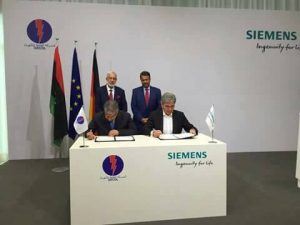By Sami Zaptia.

London, 27 January 2021:
The prime minister of Libya’s internationally recognized government, Faiez Serraj, held a joint virtual meeting yesterday with Christian Bruch, President and CEO of Siemens Energy, and the chairman of the General Electricity Company of Libya, Weam Al-Abdali.
The meeting discussed an urgent plan to avert more crippling power cuts and blackouts this summer during peak electricity demand.
The meeting comes on the back of a warning issued by the Audit Bureau of an exacerbation of the electricity crisis in the coming summer peak due to the delay in the completion of some important projects. The warning came during a meeting between the Audit Bureau and GECOL last week. Currently, GECOL has announced rolling 3-hour power cuts in the greater Tripoli area.
The Audit Bureau had warned that generation could decrease by 25 percent due to the high summer temperatures, to below 4,000 MW, while demand could increase to 7,500 MW – leaving a peak deficit of 3,500 MW. This would lead to a total blackout of the whole electricity network, it had added.
During the meeting, Serraj presented a number of urgent demands, stressing that they should be given priority to help alleviate the severity of the electricity crisis during the coming summer peak period, and said that they are broadlines, leaving the experts and technicians to delve into their details.
Serraj demands special relationship with Siemens
Serraj expressed his desire for the partnership between Siemens and the GECOL to go beyond the limits of the traditional relationship between the owner and the contractor, to a solidarity and complementarity relationship through which it can help in transferring technology and developing the GECOL’S capabilities, whether human or technical.
Serraj three-point plan
Serraj presented three elements to achieve this, the first of which is the development and implementation of a training program to form teams of Libyan engineers certified by Siemens in maintenance and overhaul works for Siemens units.
Secondly, setting up a mechanism through which emergency technical requirements (services and spare parts) can be provided without being subject to routine and traditional procedures. Thirdly, the provision of technical support to the mechanical and electrical engineering departments at the University of Tripoli.
Siemens expresses willingness to cooperate
For his part, Siemens head Christian Bruch stressed the willingness of Siemens to cooperate in the points presented by Serraj, as it considers Libya is an effective and important partner for Siemens. Bruch also expressed his readiness for joint cooperation to reduce the severity of the electricity problem this summer.
Agreement to expediate maintenance, stalled projects
At the joint meeting, it was agreed to expedite the implementation of the largest number of overhauls and maintenance (during autumn) for the units operating in the network and to accelerate the implementation of stalled projects, including the Ubari gas station, the five units in Zahra and South Tripoli stations.
It was also agreed to intensify efforts by both parties to complete the projects that have been initiated, namely the Tripoli West Station and Misrata Station, and develop a solution for the Zliten project to accelerate the provision (or manufacture) of new units to replace previous units.
Efforts to coordinate with the contractor for the new 1,300 megawatts Tripoli South project (currently under discussion and negotiation), will also be made.






